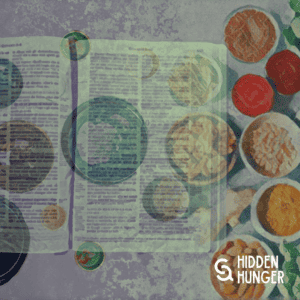 “This is my body, broken for you. This is the cup of the new covenant, sealed in my blood, shed for the forgiveness of sins.”
“This is my body, broken for you. This is the cup of the new covenant, sealed in my blood, shed for the forgiveness of sins.”
As Christians, we say some version of these words as we gather around a table to remember Jesus’ saving death and resurrection. During the Passover meal, Jesus took common elements of bread and wine and shared them in a ritual meal that we recreate again and again so that we might remember and experience God’s grace. Even while our particular traditions differ in our beliefs and understandings of this ritual, it remains a central element in the expression of our Christian faith.
The New Testament is peppered with stories of Jesus at tables and feeding people—whether Jesus and his disciples are breaking the sabbath by plucking grains to eat when they are hungry (Matt. 12:1-8, Mark 2:22-28, Luke 6:1-5), Jesus is sharing a meal with tax collectors and sinners (Matt. 9:10-17, Mark 2:15-22, Luke 5:29-39), or Jesus is feeding the multitudes (Matt. 14:13-21, Mark 6:31-44, Luke 9:12-17, John 6:1-14, Matt. 15:29-39, Mark 8:1-10). After Jesus’ resurrection, he shares a meal with the two disciples who meet him on the road to Emmaus (Luke 24:13-35), and he feeds the disciples fish and bread over a charcoal fire on the beach, when he tells Peter to “feed my sheep” and “feed my lambs” (John 20:19-21:25).
Feeding people and sharing meals are central to Jesus’ ministry, and in all of these stories, we hear God’s invitation to gather and share the blessings of God’s table with our neighbors near and far. While there are many important issues to work on, access to nutritious food is fundamental for human flourishing.
At Bread for the World, where I serve as minister for spiritual formation and wellness, we have articulated nine biblical principles around our work as a Christian advocacy organization urging U.S. decision-makers to do all they can to pursue a world without hunger. These principles ground our work to end hunger.
1. God loves us. Jesus’ greatest commandments are that we love God and each other. The Old Testament and Gospels contain the two greatest commandments. First, we are to love God (“You shall love the Lord your God with all your heart, mind, and soul…”), and, second, we are to love our neighbors (Deut. 6:4-5; Matt. 22:37-40; Mark 12:31; Luke 6:27-31), who include our enemies and those who hate and persecute us (Matt. 5:44) and anyone who is in need (Luke 10:25-37—the parable of the Good Samaritan).
Our neighbors also include people who live near us and people who live far from us. We love because God first loved us (1 John 4:19), and since God loves us so much, we also ought to love one another (1 John 4:7). We desire “to know the love of Christ that surpasses knowledge,” so that all “may be filled with all the fullness of God” (Eph. 3:19).
2. Humankind was created out of God’s love and in God’s image, so we are to respect the dignity of every person. Humankind was created out of God’s love and in God’s image (Gen. 1:26). God’s willingness to step out of eternity into time, in the person of Jesus, bestowed on humanity a dignity not of our own making. In his humility, Jesus suffered the indignity of death, even death on the cross (Phil. 2:7-11). As a result, we are able to appreciate and respect the dignity of others as well as ourselves (1 Thess. 5:12-18).
Jesus’ encounters with the Samaritan woman (John 4:1-30), Zacchaeus (Luke 19:2-5), and the rich young ruler (Matt. 19:20-22) are examples of how Jesus was committed to transcending race, gender, and class. Jesus treated all people with dignity and respect.
3. God sees, hears, and proclaims freedom and hope to people affected by hunger, poverty, and oppression. Throughout the Old Testament, God sees, hears, and responds to the cries of those who experience poverty and are vulnerable to exploitation and violence (Ex. 2:23-25; Lev. 25; Deut. 24:19-22; Isa. 3:13-15).
The Scriptures portray God as upholding the cause of those who are oppressed and providing for those affected by hunger and poverty (Ps. 146:5-9; Ps. 72; Prov. 22).
Jesus came into the world in humble circumstances (Luke 2:7). Fulfilling the prophesies of Isa., Jesus preached good news to people affected by poverty—proclaiming freedom for prisoners, sight for the blind, and the release of the oppressed (Isa. 61:1-2; Matt. 11:2-6; Luke 4:18-21).
4. God provides divine abundance for all. From God’s divine abundance all people have been blessed. Scripture highlights that our world and even our breath are gifts from God (Gen. 1-2). In the Old Testament, God provided by raining manna from heaven onto the Israelites (Exod. 16). In the Gospels, Jesus fed 5,000 people (Matt. 14:13-21; Mark 6:30-44; Luke 9:10-17; John 6:1-14), turned water into wine at the wedding in Cana (John 2:1-11), and filled the disciples’ nets with a miraculous catch of fish (John 21:1-13).
Jesus announced that he came to give life abundantly (John 10:10). We can place our trust in God’s promise of provision, as Paul told the Phil.: “God will fully satisfy every need of yours according to God’s riches in glory in Christ Jesus” (Phil. 4:19).
5. All creation is reconciled with God through Jesus Christ, and we are to work toward right relationship with God and with one another. The message of reconciliation has always been foremost in the mind of God, from the separation of Adam and Eve in the garden (Gen. 3:9) to the hope of the New Jerusalem, when “God will dwell with them; they will be his peoples” (Rev. 21:3). God so loved us that he sent Jesus, Immanuel, to be God with us (Matt. 1:23). Ps. 24:1 reminds us that the earth is the Lord’s, and the fullness thereof; the world, and they that dwell therein. The earth is the Lord’s. God reconciles not only his people but all of creation unto God’s self.
The ultimate act of restoring relationship between God and humankind is Christ’s life, death, and resurrection (2 Cor. 5:17-21). In Christ we can find peace with God, with our brothers and sisters, and even with creation itself. In Jesus, God reconciled all things (Col. 1:15-20). One of the early marks of the Church was its care for those in need (Acts 2:42-47, 4:32- 35) and its understanding that an essential component of ministry is caring for those who are marginalized (James 1:27; Acts 6:1). Just as Jesus is now our advocate (1 John 2:1-2), we can be advocates for justice (Mic. 6:8).
6. God loves justice and requires us to do justice and love mercy. The Lord is “a God of justice” (Isa. 30:18). God loves justice (Isa. 61:8; Ps. 99:4; Ps. 33:5) and requires us to do justice, love kindness, and walk humbly with God (Mic. 6:8; Amos 5:22-24). Our individual actions and societal structures should enable all to share in God’s provision: “… do not be hard-hearted or tight-fisted toward your needy neighbor” (Deut. 15:7-11).
In Exod. 16:13-19, God instructs the Israelites not to take more manna each day than they need. In Lev. 23:22, the Israelites reserved a corner of their fields for those who needed food. Jesus spoke of the importance of justice as an element of faithfulness and equitable access for all: “But woe to you Pharisees! For you tithe mint and rue and herbs of all kinds and neglect justice and the love of God; it is these you ought to have practiced, without neglecting the others” (Luke 11:42). The community in Acts 2:44-45 “had all things in common; they would sell their possessions and goods and distribute the proceeds to all, as any had need.” In 2 Cor. 8:13-15, Paul reminds the church to balance “…your present abundance and their need….”
7. Jesus said, “Whatever you do for the least of these you do for me.” We do Christ’s work when we act with and for people affected by hunger and poverty. God teaches us, through the prophets, that we are not to withhold nourishment from anyone (Neh. 5:1-13; Isa. 58:6-10; Zech. 7:8-10), not to harden our hearts, but to give and accompany one another with an open hand and an open heart (Deut. 15:10). In the Gospels, Jesus invites potential disciples to “follow” him, making it clear that discipleship entails actions of solidarity and service (Matt. 20:26-28).
Jesus urges us to act on God’s behalf and order our lives together so that all people have the necessities of life (Matt. 25:35-40) and are able to flourish. We continue Christ’s work when we “go and do likewise” (Luke 10:32-38).
8. Scripture commends a moral role for government to play in the protection, development, and prosperity of all people. Old Testament law established a structure for society with deep, divine concern for people who experience poverty and disapproval of systems that do not dignify God’s people and places them in conditions of hunger and poverty. This structure was to stand as a witness to all societies (Deut. 4:5-8). The prophets spoke out against injustice and condemned the lack of concern for people experiencing poverty, regardless of the structure of government in which they were living (Isa. 32:7; Ezek. 16:49; Amos 4:1-3, 8:4-7).
The Scriptures speak to the role and responsibility of leaders that govern to care for all of the people, including people experiencing poverty (Ps. 72; Jer. 22; Prov. 31:8-9). In the New Testament, Jesus calls his followers to love their neighbors (Matt. 22:39-40) and warns that the nations will be held accountable and judged for the ways they have treated “the least” among them (Matt. 25:31-46; Zeph. 3:8,13). Both Ps. 72 and Rom. 13 emphasize the role and responsibility of leaders. These passages suggest that our leaders are servants for the good, whether or not they acknowledge that their authority comes from God. As Paul exercised his power as a Roman citizen, so too can Christians advocate for government(s) to protect and provide for all its people (Acts 21-26).
9. We hear God’s voice in Scripture and respond with the faithful use of our own voices. Prov. says, “Speak out for those who cannot speak” (Prov. 31). Moses and the prophets spoke to those in authority (Exod. 5; Amos; Jer.). Queen Esther risked her life to advocate to the King on behalf of her kindred, the Jews (Esther 8). God took away the voice of the priest Zechariah because he failed to trust the angel. Zechariah’s voice returned after he named his son John (Luke 1). When John the Baptist grew up, he courageously used his prophetic voice to challenge the scribes and Pharisees.
Jesus spoke with divine authority throughout the Gospels. On the day of Pentecost, the early followers of Jesus received the Holy Spirit and spoke so that each person heard the good news in their own language (Acts 2). We are to be faithful and persistent in using our voices (Luke 18:1-8—the parable of the persistent widow; Matt 15:22-28—the Canaanite woman seeking healing for her daughter). We are stewards of God’s grace by speaking and serving with strength (1 Pet. 4:10-11).
 Rev. Nancy Neal is the minister for spiritual formation and wellness at Bread for the World, a Christian advocacy organization urging U.S. decision-makers to do all they can to pursue a world without hunger. Their mission is to educate and equip people to advocate for policies and programs that can help end hunger in the U.S. and around the world. To learn more, visit bread.org.
Rev. Nancy Neal is the minister for spiritual formation and wellness at Bread for the World, a Christian advocacy organization urging U.S. decision-makers to do all they can to pursue a world without hunger. Their mission is to educate and equip people to advocate for policies and programs that can help end hunger in the U.S. and around the world. To learn more, visit bread.org.


